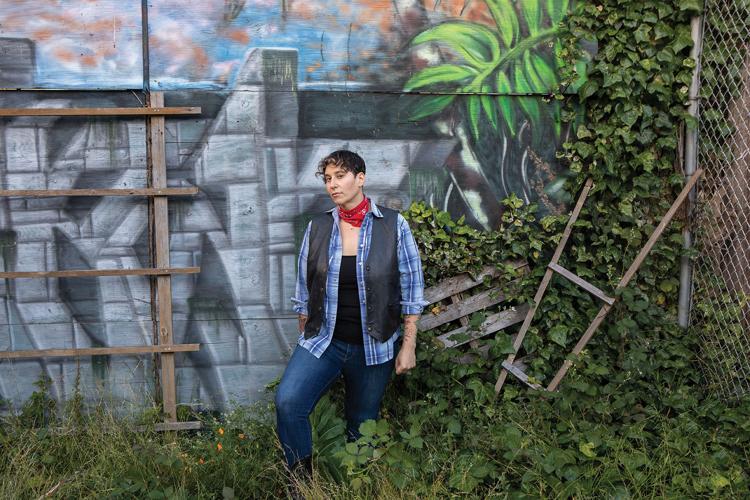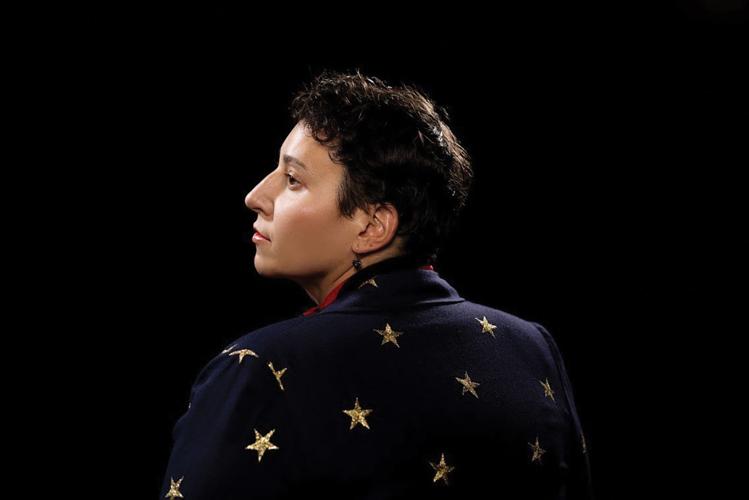
Mya Byrne
Mya Byrne is racking up plenty of firsts. She is the first openly trans artist to be played on WSM. Her album Rhinestone Tomboy, out Friday, will be the first album on legendary indie label Kill Rock Stars’ Nashville imprint. The music video for Byrne’s song “It Don’t Fade” includes a kiss with her partner, fellow songwriter Swan Real; the video premiered on CMT, and as best they can tell, it is the first kiss shared between two trans women on a national broadcast. The pair repeated their kiss during their performance at Bridgestone Arena for the Love Rising concert on March 20 — almost certainly the first to occur on that stage.
But even as Byrne celebrates her album and embraces representing trans women in country music, she and others in the trans community are bracing themselves for a backlash. The Tennessee state legislature passing laws banning certain drag performances in public spaces and gender-affirming care for youth is a symptom of social and political problems that run much deeper.
“Our joy is resistance,” Byrne observes. “The real revolutionary thing is just showing up as a trans person in any space. You’re fighting the power by just walking down the street.”
Byrne brought that sense of joyful urgency to her performance at Love Rising, a benefit for a variety of nonprofits that offer resources to LGBTQ Tennesseans. “I really wasn’t sure what I was going to say, to be perfectly honest,” Byrne recalls. While many of the performers and organizers encouraged those in the crowd to register to vote, Byrne exhorted the audience to take direct action and protest.
She points out that gerrymandering and other kinds of interference can limit individuals’ electoral voices, but people can make their power seen and felt in statehouses where laws attacking trans autonomy are up for debate. This sentiment comes through loud and clear in Byrne and Paisley Fields’ recent collaboration “Burn This Statehouse Down.” But for the most part, Byrne recalls the love she felt in the arena, both from the audience and from Swan Real.
“The power of my love with my partner Swan when we sang ‘Easy to Love’ together, and I just started crying. … Those 15,000 to 18,000 people disappeared, and it was just her and me, singing to each other in that moment. And when we kissed, it was for real.”
Byrne grew up in New Jersey, steeped in Jewish culture and her parents’ love of Coltrane, The Beatles, The Byrds, Beethoven and Crosby Stills and Nash. As a teenager and young adult in the late 1990s and early 2000s, Byrne would take herself into the city, getting off the PATH train at the Christopher Street stop and exploring the singer-songwriter scene in Greenwich Village. To get to the Village, you go left when leaving the station; Byrne jokes that if she had turned right instead, toward the Christopher Street piers that were home to trans revolutionaries like Sylvia Rivera, she would have met role models much, much sooner.

Mya Byrne
By the mid-Aughts, Byrne was integral to a downtown scene of musicians that included Aaron Lee Tasjan, who produced Byrne’s album. Though the two were friends, Tasjan — who is bisexual — and Byrne were not out to each other at the time. The scene changed drastically after 9/11, and even more following the recession in 2008, with money for the arts drying up and venues closing down. While her band The Ramblers became a staple of New York’s roots-rock scene, Byrne found her opportunities restricted when she came out as trans in 2014.
She sought a reinvention on the West Coast, where she turned her attention to rock and punk music in general and queercore specifically. With no representation for trans women in country music, Byrne felt it was best to focus her efforts where she would be welcomed. Eventually, she connected with queer country artist Cindy Emch of Secret Emchy Society, and began re-engaging with her country roots. The deal was sealed when Byrne began playing with queer country pioneer Patrick Haggerty as part of the Lavender Country revival — they met through mutual queercore friends. Onstage with Haggerty — who died last year at age 78 — Byrne met Paisley Fields.
In 2019, Emch reconnected Byrne with Mercy Bell, a Nashville-based singer-songwriter who Byrne also knew from New York. Through a queer country showcase that fall — set up by Karen & the Sorrows’ Karen Pittelman and also featuring Bell and Fields — Byrne played Nashville as herself for the first time. She finally felt like she’d come home, musically.
Byrne began working on what would become Rhinestone Tomboy during COVID lockdown, but felt it wasn’t coming together. As conversations about diversity began rippling through American society in 2020, queer country artists found a huge boost of well-deserved recognition. Byrne and Tasjan reconnected, with Tasjan enthusiastically agreeing to work with Byrne on the album.
“It was the most comfortable space,” says Byrne. “Because of this space that Aaron created for me, I was able to fly. I was able to do things I never thought I could do.”
Together, Byrne and Tasjan created a cosmic country tapestry that threads the needle between their past on the Lower East Side and their futures in Nashville. There are tinges of power pop, with crunchy guitars and ferocious solos, though the roots are firmly planted in folk and country. Byrne sounds confident and relaxed as she sings about perseverance, self-belief and the work it takes to keep relationships strong.
She actively seeks to share her platform with other trans artists — particularly trans women. But she can’t do it alone.
“I wanna see people like Chris Stapleton stand with me,” Byrne says. “I am no longer going to beg cis people to stand with us, but I do want to collaborate. By doing that, you say, ‘I stand with trans people. … If you don’t stand with trans people, you don’t stand with me.’”
Byrne has a message for her trans audience as well.
“Just remember that we are winning. If we weren’t at this precipice, people wouldn’t be pushing back so hard to eradicate us. We are legion, we are everywhere.”
Correction: An earlier version of this story incorrectly stated Aaron Lee Tasjan's identity as gay, not bisexual. We regret the error.











